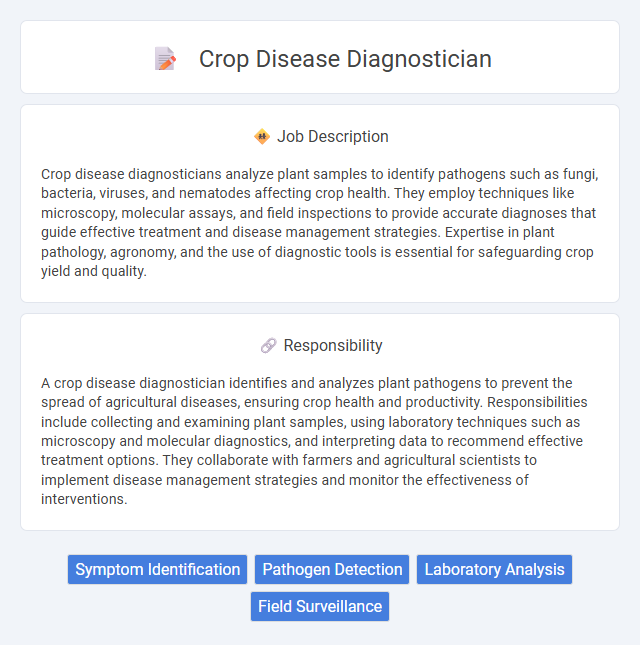
Crop disease diagnosticians analyze plant samples to identify pathogens such as fungi, bacteria, viruses, and nematodes affecting crop health. They employ techniques like microscopy, molecular assays, and field inspections to provide accurate diagnoses that guide effective treatment and disease management strategies. Expertise in plant pathology, agronomy, and the use of diagnostic tools is essential for safeguarding crop yield and quality.
Individuals with a strong interest in plant pathology and keen observational skills are likely suitable for a crop disease diagnostician role. Those comfortable working in both laboratory and field environments, while managing complex data and diagnostic tools, may find this job aligns with their abilities. Candidates who prefer routine tasks or lack patience for detailed analysis might encounter challenges in this profession.
Qualification
A crop disease diagnostician requires specialized knowledge in plant pathology, horticulture, or agricultural sciences, typically demonstrated by a bachelor's or master's degree in these fields. Proficiency in laboratory techniques, diagnostic tools such as microscopy and molecular assays, and experience with field surveys are essential qualifications. Strong analytical skills and familiarity with plant disease management software further enhance diagnostic accuracy and effectiveness.
Responsibility
A crop disease diagnostician identifies and analyzes plant pathogens to prevent the spread of agricultural diseases, ensuring crop health and productivity. Responsibilities include collecting and examining plant samples, using laboratory techniques such as microscopy and molecular diagnostics, and interpreting data to recommend effective treatment options. They collaborate with farmers and agricultural scientists to implement disease management strategies and monitor the effectiveness of interventions.
Benefit
Crop disease diagnostician roles likely offer significant benefits such as enhancing agricultural productivity and ensuring food security by timely identifying and managing plant diseases. This job may also provide opportunities to work with advanced diagnostic technologies, increasing expertise in plant pathology and contributing to sustainable farming practices. Financial incentives and career growth in agricultural research sectors could be additional advantages associated with this profession.
Challenge
Crop disease diagnosticians likely face significant challenges in accurately identifying pathogens due to the complex symptoms that often overlap among various diseases. The probability of encountering emerging or resistant strains of pathogens might complicate diagnosis and require continuous updates in knowledge and diagnostic techniques. Limited resources and the need for rapid, precise identification may increase the difficulty of managing crop health effectively.
Career Advancement
Crop disease diagnosticians play a crucial role in identifying plant pathogens to protect agricultural productivity and food security. Career advancement opportunities include specializing in fungal, bacterial, or viral diseases, pursuing advanced degrees in plant pathology or agricultural sciences, and moving into research, consultancy, or academic positions. Gaining expertise in diagnostic technologies such as molecular biology and remote sensing enhances prospects for leadership roles in agricultural biotechnology firms or government agencies.
Key Terms
Symptom Identification
Crop disease diagnosticians specialize in identifying symptoms such as leaf spots, wilting, and discoloration caused by pathogens including fungi, bacteria, and viruses. They utilize field surveys, laboratory testing, and microscopic analysis to accurately diagnose plant diseases and recommend effective treatment strategies. Early symptom identification is crucial for preventing crop loss and ensuring sustainable agricultural productivity.
Pathogen Detection
Crop disease diagnosticians specialize in pathogen detection by utilizing advanced molecular techniques such as PCR, ELISA, and microscopy to identify fungal, bacterial, and viral pathogens affecting crops. Their expertise enables early and accurate diagnosis, which is critical for effective disease management and minimizing yield losses. Integrating pathogen detection data with environmental and crop health information supports precision agriculture and sustainable crop protection strategies.
Laboratory Analysis
Crop disease diagnosticians perform detailed laboratory analysis to identify pathogens affecting plant health using techniques like microscopy, polymerase chain reaction (PCR), and culture assays. Their expertise in interpreting lab results guides effective disease management strategies to prevent crop loss. Accurate lab diagnosis is critical for timely intervention and sustainable agricultural productivity.
Field Surveillance
Crop disease diagnosticians conduct thorough field surveillance to identify early signs of plant pathogens and pest infestations, enabling prompt intervention to protect crop health. They utilize advanced tools such as remote sensing technology, drones, and GIS mapping to monitor large agricultural areas accurately. Effective field surveillance helps to minimize crop loss, improve yield quality, and supports sustainable farming practices by guiding targeted disease management strategies.
 kuljobs.com
kuljobs.com